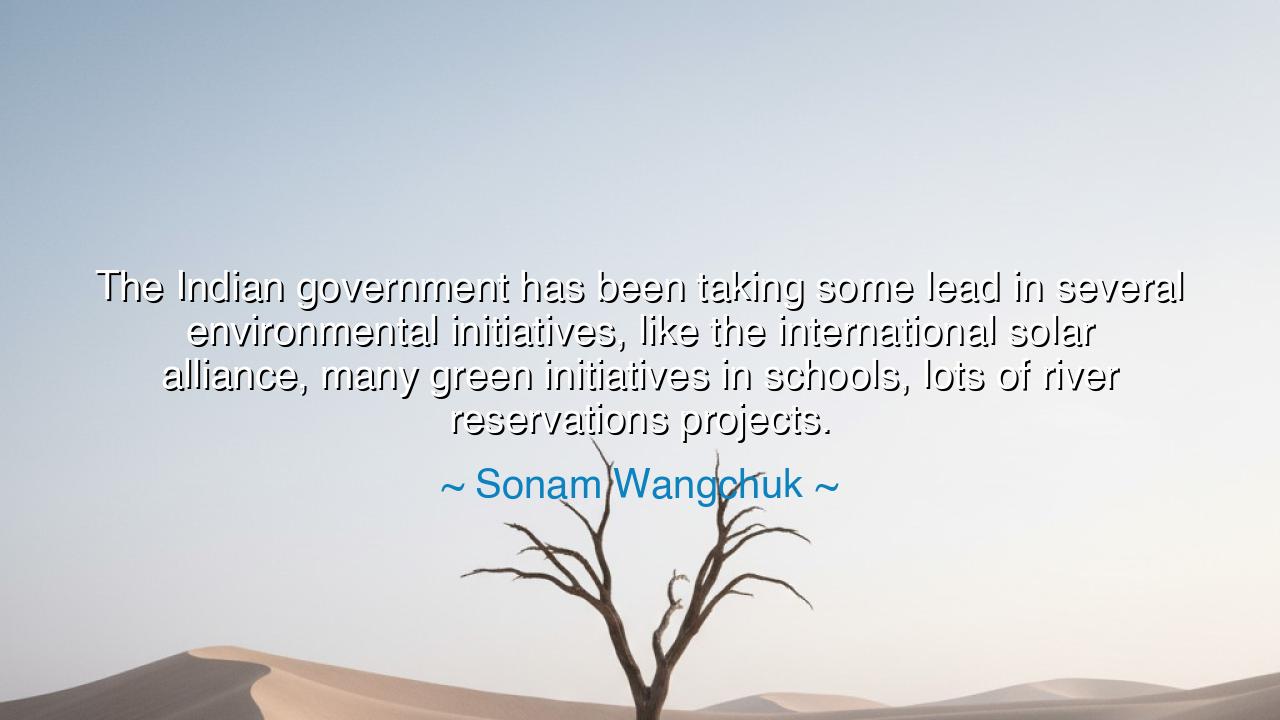
The Indian government has been taking some lead in several
The Indian government has been taking some lead in several environmental initiatives, like the international solar alliance, many green initiatives in schools, lots of river reservations projects.






Hearken to the words of Sonam Wangchuk: “The Indian government has been taking some lead in several environmental initiatives, like the international solar alliance, many green initiatives in schools, lots of river reservation projects.” In this utterance we hear not merely the praise of efforts, but the recognition of a turning tide, where nations rise to embrace their responsibility toward the earth. It is the ancient duty of humankind to care for the soil that feeds them, the waters that cleanse them, and the sun that gives them life. To forget this duty is to bring ruin, but to remember it is to walk in harmony with creation.
The international solar alliance shines as a beacon of this remembrance. It is a covenant among nations to draw power from the eternal sun, rather than from the dark entrails of the earth. Where once men carved coal from mountains and drew oil from beneath oceans, now they turn their gaze skyward, learning again what their ancestors knew—that the sun is the first and greatest gift. In this alliance, we see the beginning of a new age, where nations bind themselves not to war over fuel, but to unite under the light that falls freely upon all.
Yet Wangchuk does not speak only of mighty treaties among rulers. He speaks also of green initiatives in schools, where children learn to plant trees, to tend gardens, to honor the earth as a living companion rather than a lifeless resource. This is wisdom, for the young are the keepers of tomorrow. What is taught in the classroom will be lived in the village, the city, the nation. Just as the oak grows from a small seed, so too the guardians of the earth are shaped from the tender years of youth.
And then there are the river reservation projects, which stand as acts of reverence to waters long abused. For in India, rivers are not only streams of water; they are mothers, goddesses, lifeblood to the people. The Ganga, the Yamuna, the Indus—these rivers have borne civilization for millennia. Yet in modern times, they have been choked with filth and forgotten by those who once sang hymns to them. To reserve, to restore, to protect these rivers is to return to the sacred balance, to remember that without clean water, no society can endure.
Let us recall the story of the Nile. In the days of ancient Egypt, the Nile’s flooding was both feared and celebrated, for it brought fertility to the land. Pharaohs who respected the Nile prospered, their people fed and their temples strong. But when rulers became arrogant and mismanaged its waters, famine swept the land and empires crumbled. So too do Wangchuk’s words remind us: those who honor their rivers will thrive; those who neglect them will perish.
The meaning of this quote is thus twofold: first, that governments must lead boldly in environmental initiatives; second, that people, young and old, must follow with wisdom and participation. For no law, no treaty, no project can succeed unless it is rooted in the hearts of the people. A solar panel shines brighter when it is accompanied by a citizen who values its gift. A river flows purer when hands and hearts alike refuse to poison it.
The lesson for us is clear: be not passive inheritors of the earth, but active stewards. Support projects that protect rivers, that plant trees, that draw light from the sun. Teach your children to walk gently upon the earth, to see the soil not as dirt, but as sacred. And above all, hold leaders accountable—ask of them not only wealth or progress, but also wisdom in how they treat the land, the air, and the waters.
For in truth, the survival of nations will not be measured by their gold or their armies, but by the state of their rivers, the greenness of their fields, and the purity of their air. Let us, then, follow the path Wangchuk points to: a path where the Indian government, and all governments, lead in harmony with the earth, so that generations yet unborn may inherit not a wasteland, but a flourishing garden.






AAdministratorAdministrator
Welcome, honored guests. Please leave a comment, we will respond soon